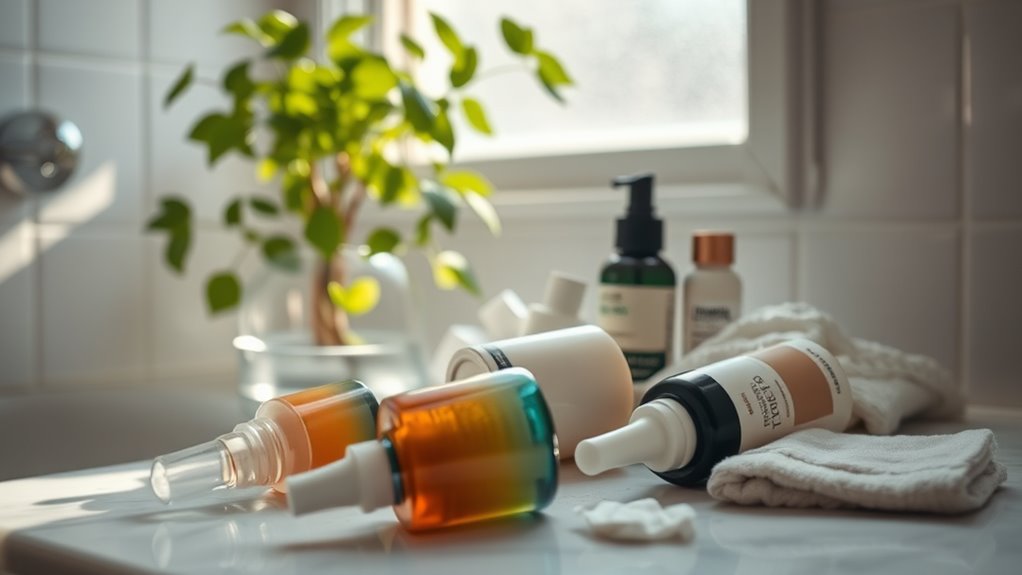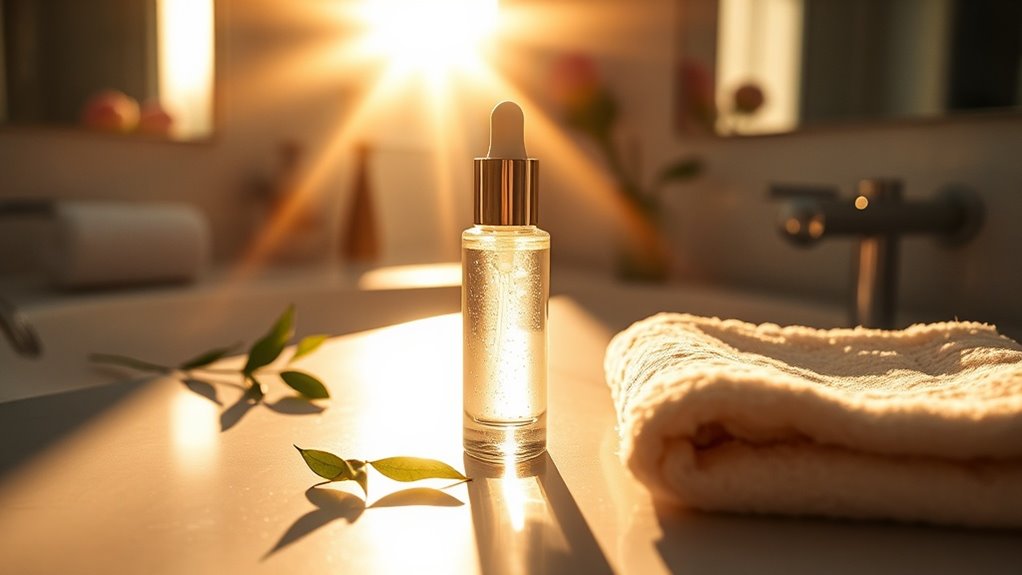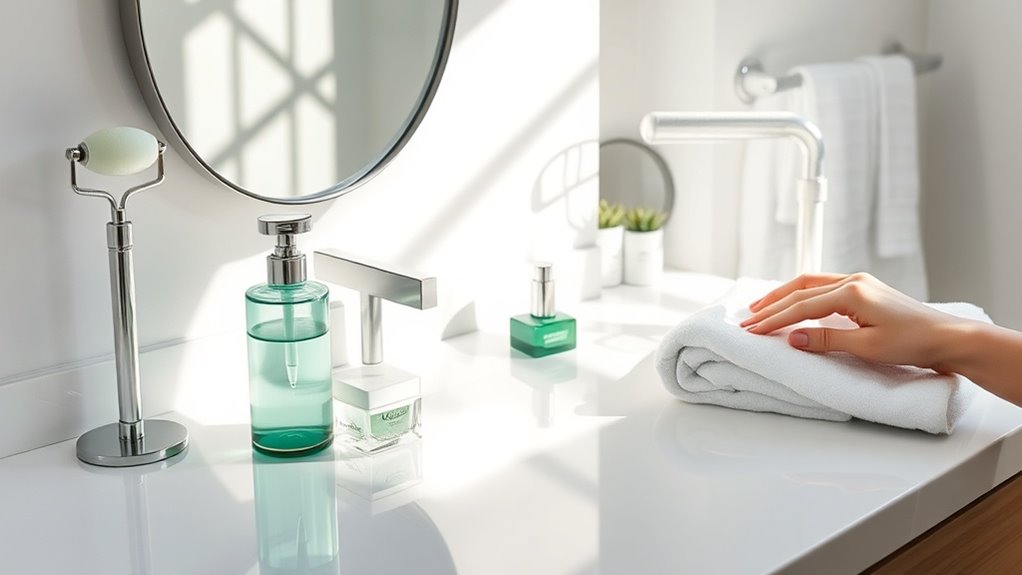What to Do When Your Skincare Routine Suddenly Stops Working
When your skincare routine suddenly stops delivering results, it’s crucial to take a step back and assess various factors. Maybe your products are harboring irritants or gone past their prime. Or perhaps your skin’s needs have evolved due to aging, environmental influences, or lifestyle shifts. Understanding these changes can guide your next steps, but there’s more to consider before you make adjustments.
Evaluate Your Current Products
To determine why your skincare routine isn’t yielding the desired results, start by closely evaluating your current products.
Check the ingredients; are they effective and suitable for your skin type? Often, you might hit a routine plateau, where products no longer deliver the same results.
This stagnation could stem from overusing certain actives or your skin’s tolerance levels changing. Identify any products that might be causing irritation or breakouts, and consider their expiration dates, as outdated products are ineffective.
Additionally, assess the application methods and frequency; sometimes, minor adjustments can revitalize your routine. Be aware that certain cleansing mistakes in your routine can also weaken your skin barrier, hindering product efficacy.
Examine Your Skin’s Changing Needs
As you age or experience changes in your environment, your skin’s needs evolve, making it essential to regularly assess its condition. Factors like hormonal fluctuations, climate shifts, and lifestyle changes can affect hydration levels, oil production, and sensitivity.
You might notice dryness or increased oiliness during seasonal transitions, indicating a need for different products. Pay attention to any new concerns, such as fine lines or discoloration, and consider how they may signal a shift in your skin’s requirements. Seasonal skin care is crucial to address these variations effectively.
Keep a journal to track changes in texture, tone, and breakout patterns. By identifying these variations, you can better tailor your skincare regimen, ensuring it aligns with your skin’s current state and helping you achieve optimal results.
Identify External Factors Affecting Skin
External factors play a significant role in how your skin reacts, so it’s important to consider them.
Seasonal changes can alter your skin’s moisture levels, while environmental pollutants may contribute to breakouts and irritation.
Additionally, lifestyle adjustments, such as diet and stress, often impact your skin’s overall health, so be sure to monitor these influences. Notably, stress can trigger various skin issues and exacerbate existing conditions, highlighting the need for effective stress management in your skincare routine.
Seasonal Changes Impact
While your skincare routine might’ve worked well for you in warmer months, seasonal changes can dramatically alter your skin’s needs and behavior. Cold winter air often strips your skin of moisture, leading to dryness and irritation.
In contrast, the humidity of summer can cause excess oil production and breakouts. Transitioning between seasons may require you to adjust product formulations; for instance, heavier creams are beneficial in winter, while lightweight gels work better in summer.
Pay attention to how your skin reacts to these changes. Incorporating hydrating serums in colder months and oil-control products during hot months can help maintain balance.
Recognizing these shifts is crucial for sustaining healthy skin year-round. Adaptability is essential for effective skincare.
Environmental Pollutants Influence
Seasonal changes aren’t the only factors that can disrupt your skincare routine; environmental pollutants also play a significant role in how your skin reacts.
Exposure to toxins in the air can lead to various skin issues, causing frustration and confusion when your products no longer work.
Consider how these pollutants can impact your skin:
-
Environmental toxins can irritate and inflame your complexion.
-
Airborne particles may clog pores, leading to breakouts.
-
Heavy metals can accelerate aging, dulling your skin’s appearance.
-
Chemicals and irritants can strip away moisture, leaving skin feeling dry and compromised.
Be mindful of these influences. For effective skincare, you may need to adjust your routine to combat these external factors.
Lifestyle Adjustments Matter
Understanding how your daily habits influence your skin’s health is essential for maintaining an effective skincare routine. Various external factors, including your lifestyle, can significantly affect your skin’s condition. Here’s a quick overview of common lifestyle factors and their effects:
| Lifestyle Factor | Potential Impact |
|---|---|
| Diet | Can lead to inflammation, acne |
| Sleep Quality | Affects skin repair and hydration |
| Stress Levels | Increases breakouts and irritation |
| Hydration | Essential for skin elasticity |
| Exercise Frequency | Boosts circulation, promoting glow |
Incorporate New Ingredients Gradually
As you explore new ingredients to rejuvenate your skincare routine, it’s crucial to incorporate them gradually. Doing so helps you assess how your skin reacts without overwhelming it, minimizing the risk of irritation or adverse effects.
Consider these steps:
-
Start slow: Introduce one new product at a time to monitor reactions.
-
Patch test: Always test new ingredients on a small area before full application.
-
Observe changes: Give your skin at least a week to adapt before adding another product.
-
Document results: Keep a skincare journal to track improvements or issues.
-
Maintaining a balanced routine is essential for achieving effective results with your new products.
Consult a Skincare Professional
Sometimes, despite trying new ingredients, your skin might still not respond as expected. In these cases, consulting a skincare professional can be invaluable.
Dermatologists and aestheticians possess specialized knowledge and experience that can help identify underlying issues affecting your skin. They can assess your skin type, monitor changes, and suggest evidence-based treatments tailored to your specific needs.
In addition, a professional may recommend diagnostic tests to rule out conditions such as allergies, hormonal imbalances, or other skin disorders. They can also guide you on optimal product usage and combinations for effective results. Moreover, they can help you recognize if you are experiencing symptoms of sensitive skin, which may require a different approach to your skincare routine.
Establish a Consistent Routine
To achieve lasting results from your skincare products, establishing a consistent routine is crucial.
A well-structured regimen helps your skin adapt to ingredients and enhances effectiveness. Here are some key points to consider:
-
Frequency: Apply products at the same time daily to promote habit formation.
-
Layering: Understand the correct order to maximize absorption, starting with thinnest to thickest textures. This correct order of application ensures that each product penetrates the skin effectively.
-
Patch Testing: Introduce new products gradually to minimize irritation and monitor skin reactions.
-
Adjustments: Be prepared to make changes as your skin’s needs evolve over time.




